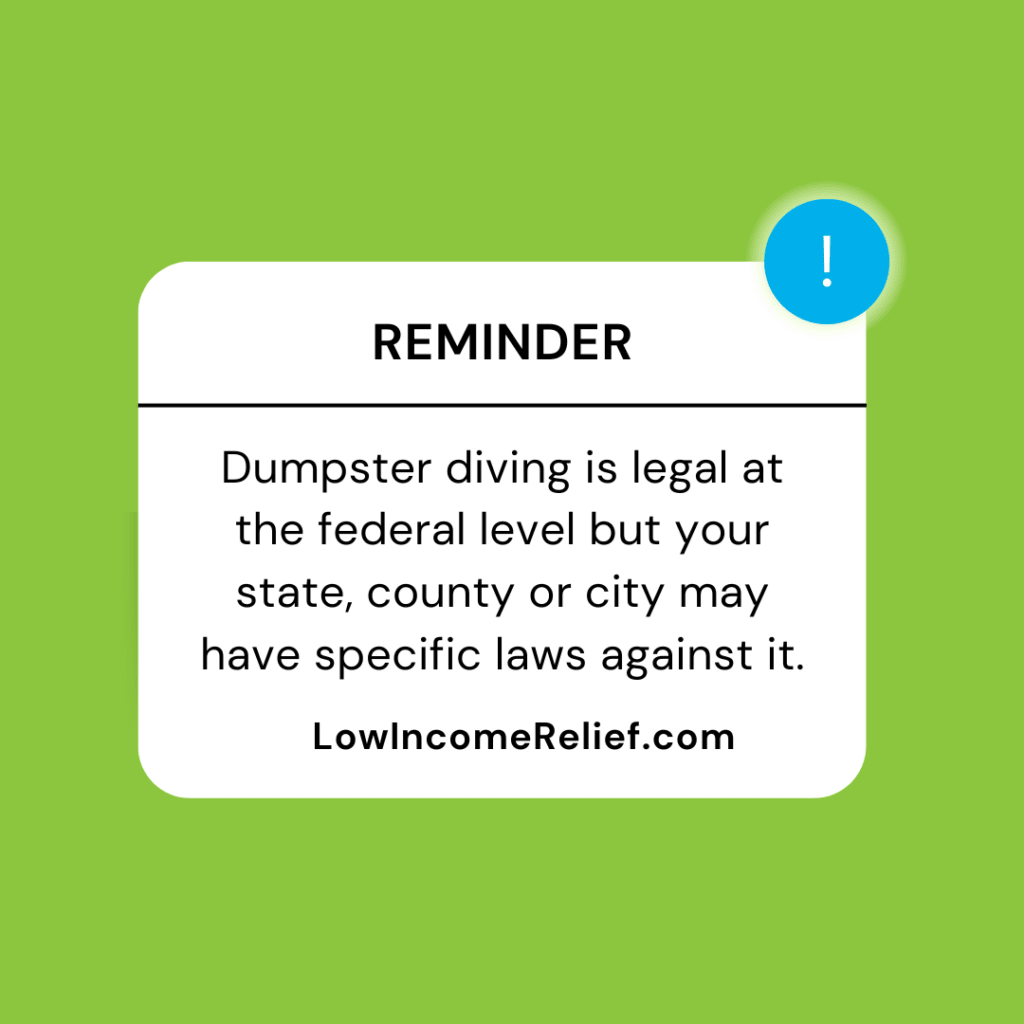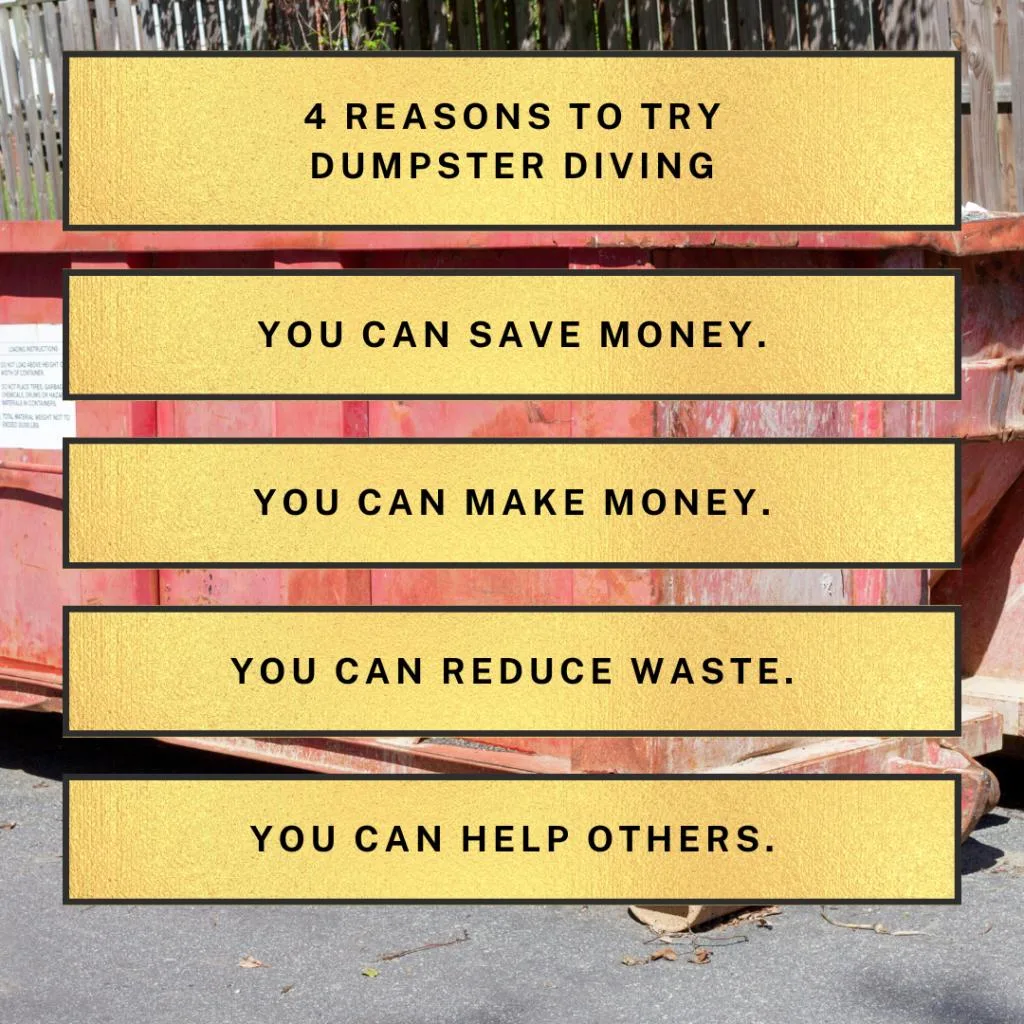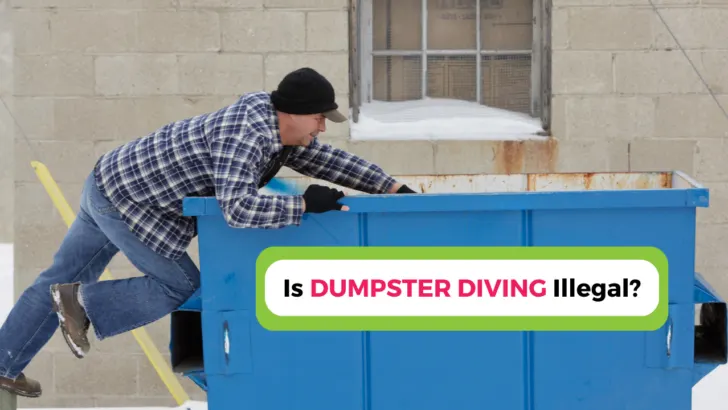Is dumpster diving illegal? How do you dumpster dive, anyway? As a beginner, it’s natural to have a lot of questions. There have been some impressive dumpster hauls shared on Facebook groups and other social media outlets lately, so more people than ever before are asking us about this quirky new hobby. After all, it seems like a relatively easy way to score everything from free food to furniture!
In this guide, we’ll attempt to address some of the most common questions. If you’ve ever wondered what dumpster diving is, is dumpster diving illegal, or how do you get started, then you’ve come to the right place.
What is dumpster diving?
Dumpster diving is the process of searching through trash for usable items. Businesses often discard usable items due to seasonality, damaged packaging, overstock, or other reasons that have nothing to do with the usability of the product. Dumpster divers seek to retrieve those items from the dumpsters or trash receptacles before they are picked up by trash collectors.
There are many synonyms for dumpster diving. Some people may call it street scavenging, curb shopping, gleaning, or creative recycling. In Britain or Australia, dumpster diving is often called “skip dipping.”
Is dumpster diving illegal?
Since the United States has layers of federal, state, county, and city governments, the legality of dumpster diving depends on where you live.
Since I am not a lawyer, I consulted with a few attorneys in preparation for this article. You’ll find their quotes sprinkled throughout this article. Let’s start with this statement from an attorney with 52,716 satisfied customers on JustAnswer named LawEducator.
Dumpster diving is legal in all states. The US Supreme Court has held that once a person puts their trash out to curb they have been deemed to abandoned it. See: CA v. Greenwood, 486 U.S. 35 (1988)
However, there are some municipal ordinances that make it unlawful.
LawEducator, JustAnswer
Dumpster diving is usually legal on public property.
At the federal level, dumpster diving is not illegal. There is no federal law against dumpster diving. It is generally accepted that garbage left in a public place has been forfeited by the owner.
In fact, the Supreme Court spoke very clearly in their 1988 decision regarding the State of California v. Greenwood that searching trash that is left in a public space is legal as long as it doesn’t conflict with any city, county or state ordinances.
Since respondents voluntarily left their trash for collection in an area particularly suited for public inspection, their claimed expectation of privacy in the inculpatory items they discarded was not objectively reasonable. It is common knowledge that plastic garbage bags left along a public street are readily accessible to animals, children, scavengers, snoops, and other members of the public. Moreover, respondents placed their refuse at the curb for the express purpose of conveying it to a third party, the trash collector, who might himself have sorted through it or permitted others, such as the police, to do so.
Supreme Court, State of California v. Greenwood
Because of this, it’s incredibly important to be able to tell the difference between a public and private dumpster. I asked LawEducator how to spot the difference.
If it is on the curb or public alley it is public, if it is in their driveway or in a parking lot it is private.
LawEducator, JustAnswer
However, it’s not always that simple. There are many factors that can make it difficult to spot what is and isn’t private property.
Everything from discarded products to documents, once they make their way into a dumpster, is a freebie anyone can pick up and use. But that’s according to federal and state law.
Things get trickier when you begin to consider more specific city and county laws, with some bodies redefining the rules to protect their people. Another set of enforceable rules is when a business specifies directions that apply to its dumpsters or when the treasure hunt involves trespassing on the business’s property. A locked dumpster, signs that discourage dumpster diving, and recycle bins are all warning signs to steer clear. Yet another legal consideration is the possibility of personal injury, in which case the specifics of the incident and several other laws and regulations come into play.
Riley Beam, Managing Attorney at Douglas R. Beam P.A.
Private property is generally off-limits.
It’s important to note that the Supreme Court decision only applies to garbage that is left in a public area. Garbage that is stored on private property is not covered by this decision, which often includes store dumpsters as they are often kept on store property.
According to LawEducator, dumpster diving is illegal on private property unless you get permission first. You’ll need to talk to the owner of the building or business in order to secure permission to search their dumpsters. Otherwise, you could face legal penalties.
It is trespassing to be on the property of someone else without their permission.
LawEducator, JustAnswer
If you decide to approach the business owner for permission, you may want to offer to sign a liability waiver. Many businesses worry about dumpster divers because they don’t want to be legally liable if you get hurt while you’re searching. After all, there may be glass or other debris in the dumpster that could hurt you. If you sign a liability waiver, that may ease some of their concerns.
Making a mess could get you into legal trouble.
Littering and disorderly conduct are also generally illegal, so it’s important to be careful while you’re searching. Don’t make a mess. Always clean up and leave the dumpster area cleaner than it was when you arrived.
If someone files a complaint, you could get into legal trouble even if you’re searching through garbage on public property. Always be ethical and considerate when you’re searching.
Never pick locks or ignore signs.
Dumpsters that have warning signs or locks may also be illegal to enter. A dumpster that is locked, even if placed on public property, may still be illegal to enter.
You also need to be aware of signage and the placement of the dumpster. If it is fenced off, chained up or locked, you could be violating the law if you enter it.
While dumpster diving is, technically, legal, this is only the case provided it doesn’t interfere with other state laws, so proceed with caution. If dumpsters are located on private property, then accessing them could constitute trespass, which is illegal.
Look for signage that indicates a threat of legal action. Avoid interfering with dumpsters that are fenced off, chained up, or locked. Every state is different, so check the specific laws for your location.
Martin Gasparian, Attorney/Owner, Maison Law
Don’t touch the recycling bin!
Dumpsters and recycling bins may be placed close together but they are very different in the eyes of the law. It’s important that you never take recycling materials from recycling bins.
Recycling bins are considered private property and are often held by municipalities or the government. Taking goods from a recycling receptacle without authorization is theft, and offenders may face penalties or even criminal prosecution. Taking recyclable items from a recycling container may also have an impact on local recycling programs since it contaminates the recyclables and lowers the value of the recycled materials.
Jim Campbell, Owner, Camp Media
You need to check your local laws and ordinances.
Even though dumpster diving is legal at the federal level, there are still local laws that can impact your ability to dumpster dive legally. Your state, county, or even city can establish ordinances against dumpster diving. It’s important to check for these before you go.
You can do this by searching your city and county with the term “dumpster” and “ordinances.” If you’d rather simply ask someone, I recommend contacting the legal team over JustAnswer. They can quickly and competently answer your legal questions.

Why dumpster dive?
There are many reasons that people choose to dumpster dive. Although there is a common cultural stereotype of poor people scavenging dumpsters for food, that’s not always the case.
You can save money by retrieving usable items.
Frugal people who are trying to save money may choose to dumpster dive. After all, depending on which store’s dumpsters you visit, you may find everything from usable food to beauty supplies to furniture. Pet stores may have discarded pet food or supplies. It really just depends on what store’s dumpsters you’re diving into.
In several Facebook groups that are dedicated to dumpster diving, I found posts from people who regularly scavenge to reduce their own spending. At least three people remarked that they use the money they save to go on annual cruises instead!
You may be able to make money by dumpster diving.
Although many divers choose to use the items themselves, some make a profit by selling high-end items online or even by recycling eligible cans and bottles through paid state programs.
When you can resell an item that you received for free, you can make a lot of money. Be sure to check out our guide on how to sell your stuff so that you can maximize that revenue.
Using these items can help the environment.
Even those who aren’t concerned with saving or making money may choose to dumpster dive for environmental reasons. After all, what goes in the garbage usually just ends up taking space in a landfill somewhere.
Businesses throw away a lot of usable items, which are discarded and wasted. By retrieving those items, environmentally-conscious consumers can make sure that they are put to good use instead of contributing to the world’s waste.
You can serve your community.
Many dumpster divers report donating their finds to food banks and other families in need. A surprising amount of scavenging is actually done with a benevolent intention.
After all, many of the discarded items appear to be discarded in bulk. A single person can only use so much, and that excess can bless many others.
There are other reasons to dive, too.
There are other groups of people who may also have an interest in dumpster diving. These include artists, who may seek creative materials that have been discarded, or even garbologists who study trash. Unfortunately, criminals also have a vested interest in dumpster diving as sometimes the information found there can be used to commit identity theft or other crimes.

Why does so much good stuff end up in the trash?
Depending on which dumpsters are being searched, people have reported finding a wide variety of usable, high-value items. In the course of my research, I reviewed several hauls that were showcased on Facebook groups, YouTube videos, and other social media outlets.
Divers have reported finding:
- Cleaning supplies
- Clothing
- Electronics
- Food
- Furniture
- Home Decor
- Jewelry
- Makeup
- Metal
- Pet food
- Recyclable cans and bottles
- Toys
- Wood
- and more!
Businesses often discard items that are out-of-season (such as leftover Christmas items in January), nearing their expiration dates, returned by consumers, or that have damaged packaging. It is generally more affordable for businesses to discard these items than store them or return them to manufacturers.
Altogether, our world wastes over a billion dollars in usable products every year. It is simply unfathomable how many good, viable products are destroyed by businesses. Relatively few countries have taken action to prevent the destruction of unsold items.
For example, the US Department of Agriculture estimates that up to 40% of all food in the United States is wasted. The government has called upon all parts of the supply chain, including consumers and communities, to reduce that waste.
“In the United States, food waste is estimated at between 30–40 percent of the food supply… Food is the single largest category of material placed in municipal landfills and represents wasted nourishment that could have helped feed families in need.”
USDA
It’s not just in the United States, either. In a 2019 interview with NPR, environmental journalist Andrea Vasil revealed just how much waste is happening in certain countries.
“The prime minister actually said that they estimate that France destroys $900 million worth of perfectly good products every year. And so they are bringing in a ban on the destruction of unsold goods.”
Andrea Vasil, environmental journalist and managing editor of Corporate Knights Magazine
Andrea also revealed why businesses choose to destroy these items. Not only do businesses save money by discarding unsold products, it also protects their ongoing revenue streams and sometimes even their brand image.
“A lot of clothing companies in particular have been caught destroying last year’s goods or unsold products, excess merchandise because they do not want to flood the market with the discounted products. They do not actually want to give it to charity and see it go on people who are not necessarily in their target demographic, which is a pretty horrible, problematic thing.”
Andrea Vasil, environmental journalist and managing editor of Corporate Knights Magazine
There are many reasons why businesses choose to discard usable products. These are just a few.
How to Protect Yourself from Dumpster Divers
If you’ve somehow landed on this article because you’re worried about someone finding sensitive data in your garbage, let’s take a quick moment to discuss how you can keep yourself safe.
Since garbage placed in public areas is not protected, it’s important to always shred or destroy documents that contain sensitive information about you. Don’t simply throw away paperwork that includes your Social Security Number or banking information. You shouldn’t even discard papers that have your name and address together (such as envelopes or magazines). Always shred or destroy that information so it is private and confidential.
If you’re still worried about people searching through your garbage, you can also protect yourself by keeping your trash bins on private property until it is time for collection. Don’t take them to the street earlier than necessary.
Businesses can also discourage dumpster divers by refusing to throw away usable, valuable items. Donate usable food to a food bank instead of throwing it away. Donate usable clothing, furniture, or household goods to a local thrift store. In many cases, these nonprofit organizations will gladly arrange pickup for your discarded items. This will help those items be put to good use, protect the environment, and reduce the incentive for people to search through your businesses’ trash.

